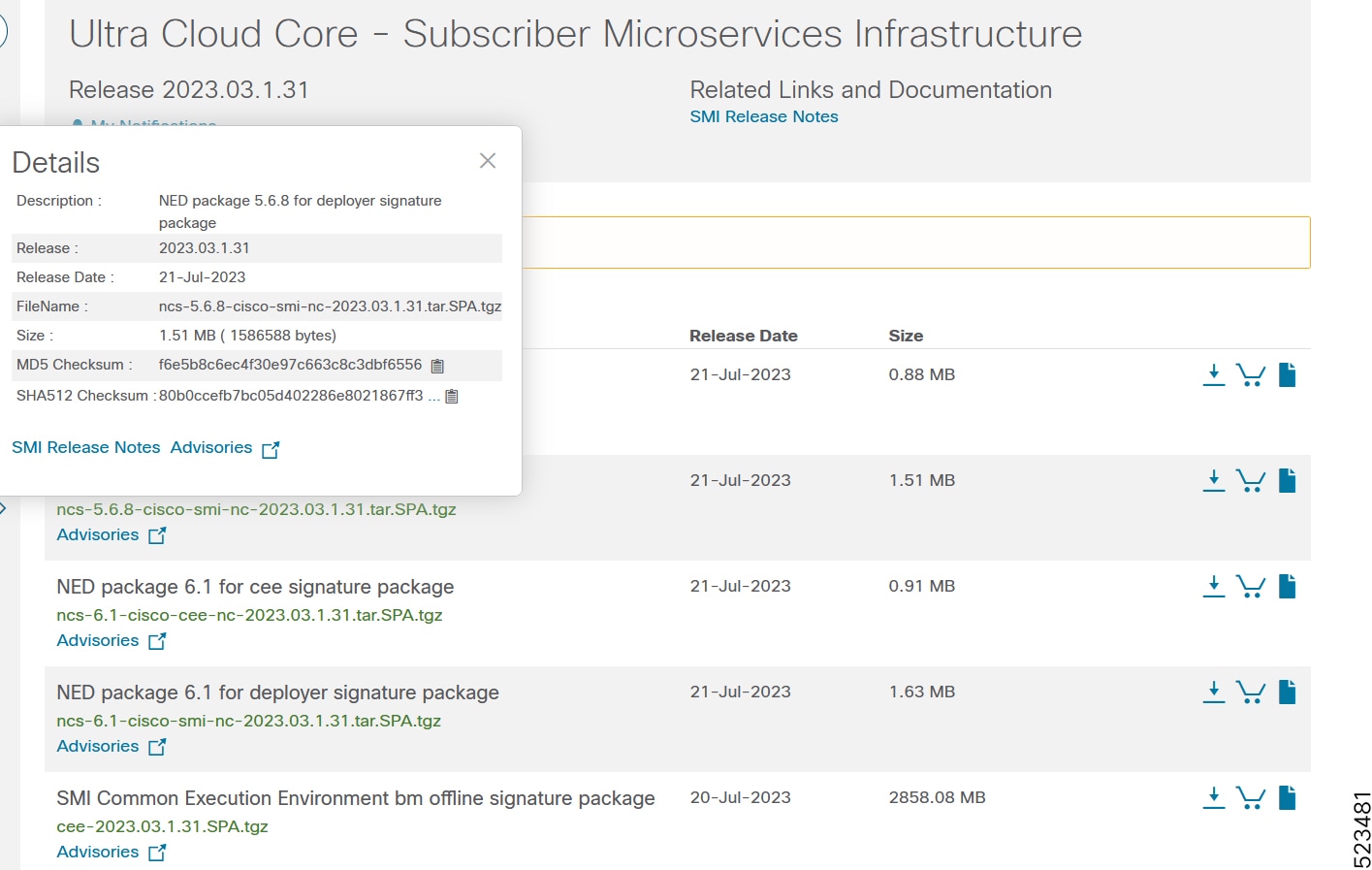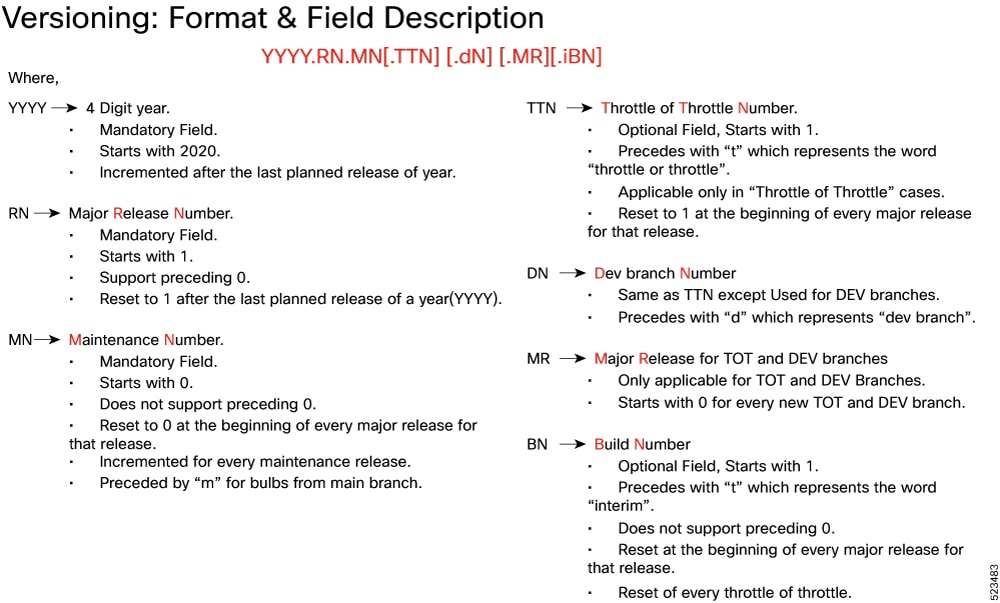Ultra Cloud Clore Subscriber Management Infrastructure
Introduction
This Release Notes identifies changes and issues related to this software release.
Release Lifecycle Milestones
|
Release Lifecycle Milestone |
Milestone |
Date |
|---|---|---|
|
First Customer Ship |
FCS |
31-Jan-2025 |
|
End of Life |
EoL |
31-Jan-2025 |
|
End of Software Maintenance |
EoSM |
1-Aug-2026 |
|
End of Vulnerability and Security Support |
EoVSS |
1-Aug-2026 |
|
Last Date of Support |
LDoS |
31-Aug-2027 |
These milestones and the intervals between them are defined in the Cisco Ultra Cloud Core (UCC) Software Release Lifecycle Product Bulletin available on cisco.com.
Release Package Version Information
|
Software Packages |
Version |
|---|---|
|
smi-install-disk.22.04.0-20250107.iso.SPA.tgz |
22.04.0-20250107 |
|
cee-2025.01.1.14.SPA.tgz |
2025.01.1.14 |
|
cluster-deployer-2025.01.1.14.SPA.tgz |
2025.01.1.14 |
|
NED Package |
ncs-6.1.14-cisco-cee-nc-1.1.2025.01.1.14.tar.gz ncs-6.1.14-cisco-smi-nc-1.1.2025.01.1.14.tar.gz |
|
NSO |
6.1.14 |
Descriptions for the various packages provided with this release are provided in the Release Package Descriptions section.
Verified Compatibility
|
UCS Server |
CIMC Firmware Version |
|---|---|
|
Cisco UCS C220 M7 |
4.3(3.240022) |
|
Cisco UCS C220 M6 |
4.2(2a) or later |
|
Cisco UCS C220 M5 |
4.1(3f) or later It is recommended that you use version 4.3.2.240009 with this release. |
-
For deployment of C-Series M6 and M7 servers, it is mandatory to enable secure boot on the servers.
-
For C-Series M5 servers, it is recommended to use UEFI boot mode and enable secure boot for more security. This will align the older hardware settings with the newer hardware requirements.
What's New in this Release
Features and Enhancements
This section covers a brief description of the features and enhancements introduced in this release. It also includes links to detailed documentation, where available.
| Feature | Description | ||||
|---|---|---|---|---|---|
|
CoreDNS Configuration |
SMI allows configuration of CoreDNS parameters for policy and cache updates via the SMI Cluster Manager. This enhancement streamlines DNS management and improves network performance. Command Introduced: clusters cluster_name configuration core-dns string |
||||
|
Kubernetes Version Upgrade |
With this release, you can upgrade the Kubernetes version from 1.30 to 1.31. |
||||
|
Software Upgrade from 2024.03.1 to 2025.01.1 |
You can upgrade SMI directly from 2024.03.1 to the latest 2025.01.1 release, which includes a new base image and a security patch. This release also upgrades the K8s version from 1.29 to 1.31.
The following actions must be performed before upgrade:
|
||||
|
SMI provides configuration options to improve CPU performance by adjusting the CPU scaling governor settings. This feature allows the operator to switch between "powersave" and "performance" modes, with "powersave" as the default setting. The operator changes the governor setting to "performance" to increase system performance during demanding workloads. Commands Introduced: |
|||||
|
UPF HDD Size Customization for Enhanced Data Storage |
SMI introduces the ability to customize the HDD size for UPF, ranging from the default 16GB up to a maximum of 999GB. This flexibility supports additional storage needs for EDRs, CDRs, and PCAP traces. Commands Introduced: clusters cluster_name disk-size size_value |
||||
|
Updated Versions for Third-Party Software |
SMI supports updated versions for the following third-party software in this release:
|
||||
|
Upgrade of OS to Ubuntu 22.4 |
This release recommends upgrading the SMI base image and Cluster Manager to Ubuntu 22.04. Additionally, it is recommended to update the Inception Server to the latest SMI disk ISO and refresh the container images in smi-app, smi-library, smi-build, smi-shared, smi-incubator, and related components.
|
Behavior Changes
This section covers a brief description of behavior changes introduced in this release.
| Behavior Change | Description |
|---|---|
|
Change in VPP Defaults for UPF Deployment on M6 and M7 Servers |
Previous Behavior: The default VPP count was a third of the available cores for UPF. New Behavior: The VPP count is now hardcoded for UCS C220 M6 and M7 servers as follows:
Note that the VPP count can be configured in the Cluster Manager. If this configuration is available, the configured VPP values take precedence over the default values. Each host can reserve only one core if hyperthreading is enabled. Customer Impact: Existing deployments and upgrades will retain their current settings. These new values apply only to new deployments. |
Resolved Security Issues
This section contains information about resolved security issues including severity and description.
| Severity | ID | Description |
|---|---|---|
| Critical | 213189 | GStreamer vulnerability (USN-7174-1) |
| Critical | 148367 | Python Unsupported Version Detection |
| Critical | 209121 | libarchive vulnerabilities (USN-7070-1) |
| Critical | 211522 | GLib vulnerability (USN-7114-1) |
| High | 211884 | Twisted vulnerability (USN-6988-2) |
| High | 209164 | Linux kernel vulnerabilities (USN-7073-1) |
| High | 212270 | Intel Microcode vulnerabilities (USN-7149-1) |
| High | 212722 | Linux kernel vulnerabilities (USN-7159-1) |
| High | 213100 | Linux kernel vulnerabilities (USN-7173-1) |
| High | 209984 | libarchive vulnerability (USN-7087-1) |
| High | 210006 | Linux kernel vulnerabilities (USN-7088-1) |
| High | 211896 | libsoup vulnerabilities (USN-7126-1) |
| Medium | 212213 | Expat vulnerability (USN-7145-1) |
| Medium | 209876 | urllib3 vulnerability (USN-7084-1) |
| Medium | 207723 | Intel Microcode vulnerabilities (USN-7033-1) |
| Medium | 207823 | ConfigObj vulnerability (USN-7040-1) |
| Medium | 211586 | Python vulnerability (USN-7116-1) |
| Medium | 183592 | NTP vulnerability (USN-5175-1) |
| Medium | 209342 | AMD Microcode vulnerability (USN-7077-1) |
| Medium | 209028 | nano vulnerability (USN-7064-1) |
| Medium | 207996 | Vim vulnerability (USN-7048-1) |
| Low | 211920 | Vim vulnerability (USN-7131-1) |
| Low | 213082 | curl vulnerability (USN-7162-1) |
Installation and Upgrade Notes
This Release Note does not contain general installation and upgrade instructions. Refer to the existing installation documentation for specific installation and upgrade considerations.
Software Integrity Verification
To verify the integrity of the software image you have from Cisco, you can validate the SHA512 checksum information against the checksum identified by Cisco for the software.
Image checksum information is available through Cisco.com Software Download Details. To find the checksum, hover the mouse pointer over the software image you have downloaded.

At the bottom you find the SHA512 checksum, if you do not see the whole checksum you can expand it by pressing the "..." at the end.
To validate the information, calculate a SHA512 checksum using the information in the following table and verify that it matches with the one provided on the software download page.
To calculate a SHA512 checksum on your local desktop, refer to the following table please.
|
Operating System |
SHA512 Checksum Calculation Command Examples |
|---|---|
|
Microsoft Windows |
Open a command line window and type the following command: |
|
Apple MAC |
Open a terminal window and type the following command: |
|
Linux |
Open a terminal window and type the following command: Or |
|
NOTES: <filename> is the name of the file. <extension> is the file extension (e.g. .zip or .tgz). |
|
If the SHA512 checksum matches, you can be sure that no one has tampered with the software image, or the image has not been corrupted during download.
If the SHA512 checksum does not match, we advise you to not attempt upgrading any systems with the corrupted software image. Download the software again and verify the SHA512 checksum again. If there is a constant mismatch, please open a case with the Cisco Technical Assistance Center.
Certificate Validation
SMI software images are signed via x509 certificates. Please view the .README file packaged with the software for information and instructions on how to validate the certificates.
Open Bugs for this Release
The following table lists the open bugs in this specific software release.
 Note |
This software release may contain open bugs first identified in other releases. Additional information for all open bugs for this release are available in the Cisco Bug Search Tool. |
|
Bug ID |
Headline |
|---|---|
|
Intf name changed on Mellanox NIC after upgrading from Oct'24 to Jan'25 |
|
|
SNMP traps not sent when internal and external VIPs are on 2 different nodes |
Resolved Bugs for this Release
The following table lists the resolved bugs in this specific software release.
 Note |
This software release may contain resolved bugs first identified in other releases. Additional information for all resolved bugs for this release are available in the Cisco Bug Search Tool. |
|
Bug ID |
Headline |
Behavior Change |
|---|---|---|
|
M6 UPFs got redeployed on second cluster sync, configs wiped out |
Yes |
|
|
Errors seen in BMC log exporter, SEL not reset after 2000 entries |
No |
|
|
Node isolation feature with tolerance not working as expected |
No |
Operator Notes
Cloud Native Product Version Numbering System
The show helm list command displays detailed information about the version of the cloud native product currently deployed.

The appropriate version number field increments after a version has been released. The new version numbering format is a contiguous sequential number that represents incremental changes between releases. This format facilitates identifying the changes between releases when using Bug Search Tool to research software releases.
Release Package Descriptions
The following table lists the descriptions for packages that are available with this release.
|
Software Packages |
Description |
|---|---|
|
base.<version>.iso.SPA.tgz |
The application-level POD ISO image signature package for use with bare metal deployments. This package contains the base ISO image as well as the release signature, certificate, and verification information. |
|
cee.<version>SPA.tgz |
The SMI Common Execution Environment (CEE) offline release signature package. This package contains the CEE deployment package as well as the release signature, certificate, and verification information. |
|
cluster-deployer-<version>.SPA.tgz |
The SMI Deployer image signature package for use with bare metal deployments. This package contains the Deployer image as well as the release signature, certificate, and verification information. |
Obtaining Documentation and Submitting a Service Request
For information on obtaining documentation, using the Cisco Bug Search Tool (BST), submitting a service request, and gathering additional information, refer to https://www.cisco.com/c/en/us/support/index.html.
 Feedback
Feedback